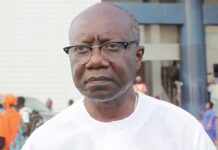
The Office of the Special Prosecutor (OSP) and the Controller and Accountant General’s Department have discovered that some people have been placed on the government payroll and been taking salaries as teachers for teaching in a non-existent basic school in the Kumbungu District of the Northern Region.
This was contained in an investigative report by the Office of the Special Prosecutor and Controller & Accountant General’s Department on Government of Ghana Payroll Administration (Phase I Vol. 1) released Monday, May 20, 2024.
According to the report, although no such school existed in reality, there were staff in the school who were being validated each month to receive salaries.
Highlighting the observations of the investigation, the two agencies described as “extremely worrisome”, how an institution that never existed found its way on the government payroll for regular payments.
“In one instance, it was discovered that xxxxxx DA Primary School in the Kumbungu District of Ghana Education Service did not exist at all. Yet, this non-existent contrived entity was represented as staffed and the purported staff were being validated monthly and being paid salaries.
“It is extremely worrisome that a non-existent entity had been designated as a functioning District Assembly Primary School and the data of the artificially created staff had found its way into the government payroll system for regular payments,” portions of the report stated.
The report generally highlighted on validation breaches at the two main institutions it covered in the region, observing that “the payroll system in the Northern Region (covering educational institutions under Ghana Education Service and the Tamale Teaching Hospital) is attended to by an alarming number of unauthorised and inactive validators.
“Indeed, most of the management units were found to be validating persons through the use of unauthorised and inactive validators’ credentials. That is to say, the credentials of deceased and retired validators were being actively used in the validation process. Then again, transferred validators were purporting to engage in validation with their inactive previous credentials.”
Read the full report here.
Auditor-General reveals how 22 assemblies spent GHC2.4m to collect GHC1.3m revenue












